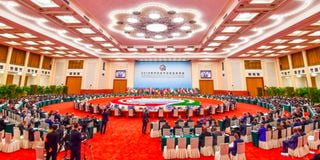China-Africa economic, trade exhibition crucial

A gathering of African Heads of State and Government at a High Level meeting during the Forum on China-Africa Cooperation (FOCAC) 2018 Summit in Beijing, China.
In the past couple of decades, trade between China and Africa has increased significantly with volumes and product variety broadening yearly.
But the trade balance was largely skewed in China’s favour with the Chinese exporting to Africa all manner of products. China imported mainly raw materials from Africa.
To promote the economic and trade collaboration and mitigate the allegation of unfavourable trade practices with Africa, China’s President Xi Jinping proposed the China-Africa Economic and Trade Exhibition (CAETE) at the 2018 Beijing FOCAC Summit. At the biennial expo, Africa and China showcase the best they have to offer each other and, thus, promote a more balanced trade engagement.
The inaugural CAETE was held in Changsha City, Hunan Province, in June 2019. Others have been held in Hunan (2021 and 2023). The first-ever CAETE outside China is being held in Kenya. This is a key test of African countries’ capacity to hold an expo of a grand magnitude. Exhibitions in China are organised at very imposing scales with acute attention to detail, razor-sharp planning and a fervent effort to ensure visitors’ comfort and convenience.
Key expo events
I was privileged to attend and organise key expo events, including facilitating Kenyan government agencies and businesses to participate in them. At the first CAETE, each African country had a well-decorated booth. China had several companies, both private entities and state-owned agencies.
The impression I got from the first CAETE, sadly, was that most African countries had not earnestly considered its importance and significance, or prepared adequately for the opportunity at hand.
While Chinese exhibitors demonstrated the use of the latest technological advancements—such as driverless cars, 5G internet, remote surgery, robots and artificial intelligence (AI), many African countries displayed raw or semi-processed agricultural produce like coffee beans, hides and skins and macadamia nuts. Processed products, such as tea or cocoa, were hardly presented in attractive packaging.
The Chinese market takes packaging and presentation very seriously, investing a lot of research and resources in coming up with state-of-the-art packaging for their products to ensure presentability and acceptability. Granted, several African SMEs presented attractive, well-done, value-added products, like finished leather products and processed agricultural products, that caught the attention of international markets, securing business and partnerships.
Trade interaction
While culture is important and can equally be exported, it is an economic and trade interaction and, therefore, Africans must go beyond mere sentimentalism and seek ways to reap maximum economic benefit from the engagement with China. I was saddened by dancers from one of the African countries who, after dancing well with African baskets on their heads, summed it up by wooing the by-standing audience to donate into the baskets, which consequently turned into begging bowls.
In Chinese culture, one must strive to be on the giving side, or at least not appear to be a beggar or perennial recipient! Much as there ought to be cultural exchanges, Africa must select pensively what cultures they want to exhibit and be known for. These form strong perceptions in the minds of our international partners, determining the respect we get.
I hope at the 4th CAETE, in Nairobi on May 9-11, the host nation and continent have put on the same, if not better, economic lenses as China, keen to extract the most benefit for the posterity of African nations.
Mr Muthamia, lecturer of Chinese language and culture at several Kenyan universities, is the founder of the China-Africa Liaison Centre and formerly worked as the China Liaison Adviser at the International Trade Centre. [email protected]. @thinkerisaac




